Movie Review – Bohemian Rhapsody
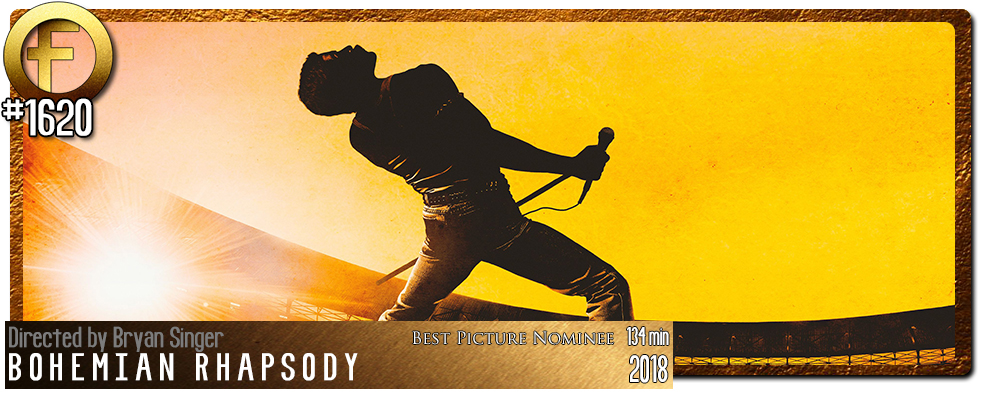
Principal Cast : Rami Malek, Lucy Boynton, Gwilym Lee, Ben Hardy, Joseph Mazzello, Aidan Gillen, Tom Hollander, Allen Leech, Mike Myers, Aaron McCusker, Meneka Das, Ace Bhatti, Priya Blackburn, Max Bennett, Dermot Murphy, Dickie Beau, Neil Fox-Roberts, Jack Roth, Phillip Andrew, Michelle Duncan.
Synopsis: A chronicle of the years leading up to Queen’s legendary appearance at the Live Aid (1985) concert.
****
Although considered rock royalty today, British supergroup Queen were mildly dismissed back in the day by a variety of critics and record producers, until their meteoric rise to the top (and back down) culminated with a legendary performance for Live Aid, ostensibly to raise money for starving children in Africa, in the mid-1980’s. Queen, led by the charismatic and vocal Freddie Mercury, gave us stadium and radio anthems such as “We Will Rock You”, “Radio Gaga”, “We Are The Champions” as well as the titular “Bohemian Rhapsody”, a quasi-operatic ballad that transformed the group and became a symbol of their status within the music industry. Bryan Singer’s Bohemian Rhapsody, a film mired in production woes, skims the surface of Mercury’s controversial life as well as the potted history of Queen’s successes, offering a swaggering love-letter to the legendary group that you’ll love despite feeling like it doesn’t quite go far enough in digging into the meat of the people involved.
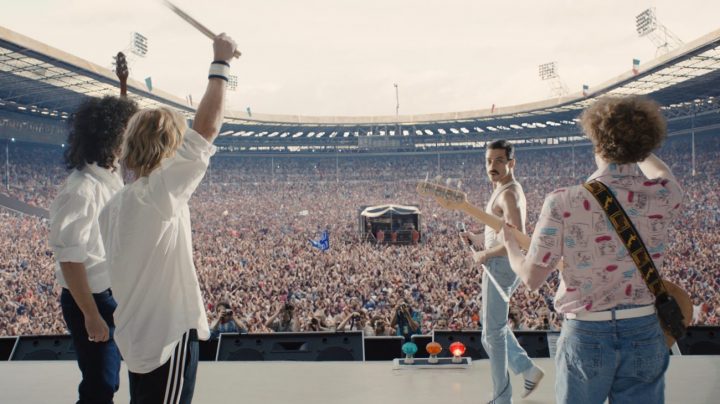
In the early 1970’s, a struggling English band Smile are followed by prodigious musical talent Farrokh Bulsara (Rami Malek), who offers to sing for them when their original lead singer suddenly quits. Assuming the name Freddie Mercury, the band, comprising lead guitarist Brian May (Gwylim Lee – The Tourist), bass guitarist John Deacon (Joseph Mazzello – The Pacific) and incoming drummer Roger Taylor (Ben Hardy – X-Men: Apocalypse), re-purpose their brand as Queen and soon become successful. Their agent, John Reid (Aidan Gillen – Game Of Thrones) and lawyer Jim Beech (Tom Hollander – Pirates Of The Caribbean) take the band to America to tour, where their debut album becomes a smash hit. As their success rises, however, Freddie’s eccentric behaviours cause friction, and his relationship with girlfriend Mary (Lucy Boynton – Sing Street, Apostle) sours, Queen’s greatest test may come with continuing to produce their particular brand of anthemic rock despite all the obstacles in their way.
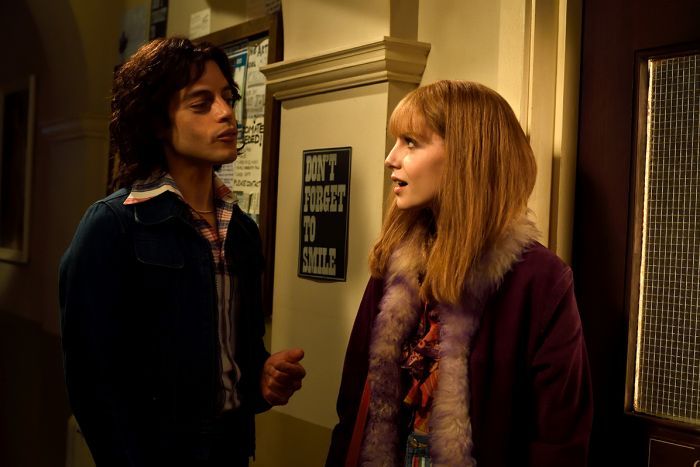
Biographical films rarely tell the absolute truth. Given there’s almost always two sides to every story, the biopic genre is inevitably flawed in favour of whomever is producing the film, and the specific story they want to tell. Bohemian Rhapsody is produced by the remaining Queen members, so as you’d imagine it paints the band in a (mainly) good light despite the well-known problems faced by the group and Freddie Mercury during the 70’s and 80’s. The film plays like a stadium concert: pick the best bits the audience will know, ratchet up the volume, and saturate the screen with slick visuals to get the feet tapping and the hands clapping. It’s a biopic so in love with its subject matter that even the melancholy, dramatic moments are plundered by the enthusiastic recreations of famous Queen touchstones, from genesis of their most famous tracks (the sequence involving the recording of “Bohemian Rhapsody” is terrifically done) to Freddie’s AIDS diagnosis, culminating in the iconic Live Aid performance at Wembley Stadium in 1985. Less a criticism than a note of caution for those hoping Bohemian Rhapsody might be a warts-n-all work, the film’s gangbuster musical soundtrack and dedicated performances by all involved – particularly Malek as Freddie, a role he was seemingly born to play – will delight hardcore fans of the band but not quite satiate the thirst for a deeper understanding of Freddy’s predilections.
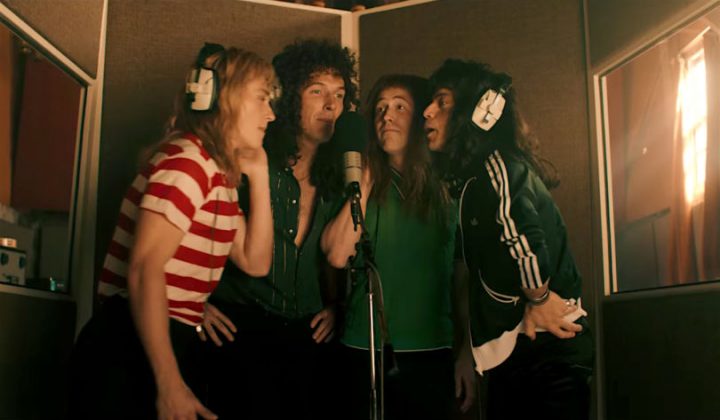
Oscar-nominated screenwriter Anthony McCarten (The Theory of Everything, Darkest Hour) takes on the mammoth task of turning a decade-and-a-half of Queen into a two-hour movie, and to be fair he does a really, really good job. This isn’t the stuff that’ll see him on the Academy stage, but in terms of pure crowd-pleasing potted-history work it’s right up there. It’s also both incredibly funny and desperately melancholy: we all know what happens to Freddie Mercury later in his life, so with every soaring ballad and lip-twitching monologue the weight of foreknowledge tends to revel in our sense of loss, a lament of what we lost when the man died of HIV-AIDS in 1991. McCarten’s writing doesn’t so much delve into Freddie’s somewhat tragic backstory as it offers a piecemeal generic familial issue to prop up its lack of dramatic urgency.
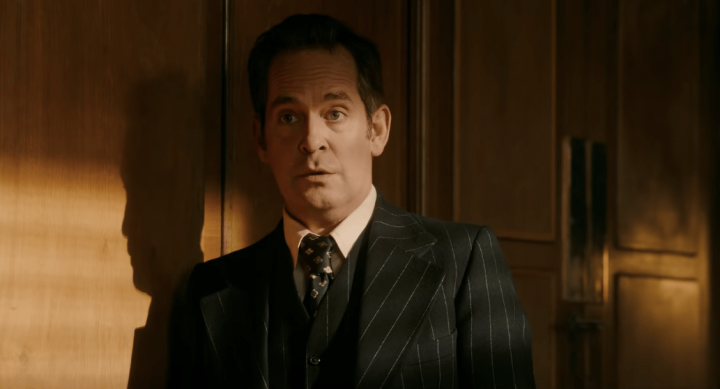
Freddie’s fractious relationship with his father (Ace Bhatti, given very little room to work, sadly) is largely formulaic, a broad-side easy-to-understand way of giving Freddy a sense of personal loss to juxtapose against his incredible public success. His equally bizarre relationship with Mary Austin, played by doe-eyed Lucy Boynton, with whom he is married before realising he is a homosexual, is examined in far more detail but never quite generates the passion behind his life we need – although a late-scene confrontation between the pair is somewhat cathartic – leaving McCarten’s script to simply retread the rise, fall and resurrection of Queen as a band through the most popular era of their existence. I say that like it’s a bad thing (it isn’t), but I wanted to understand more about Freddy the man rather than the performer, and his relationships (particularly with the members of Queen), rather than be just an excuse to recreate classic moments of the band’s history to a thunderous Dolby Atmos soundtrack. If it sounds like I was disappointed with the film, I apologise, because I really did like it, I just felt that reflecting on the band’s career and Freddie’s struggles with identity and sexuality and relational confusion didn’t go far enough, or far enough for me to make the film a work of genuineness. That’s what’s missing here, genuineness. The film’s struggle to balance Queen’s version of the truth with the actual truth is weighted heavily in favour of the band.
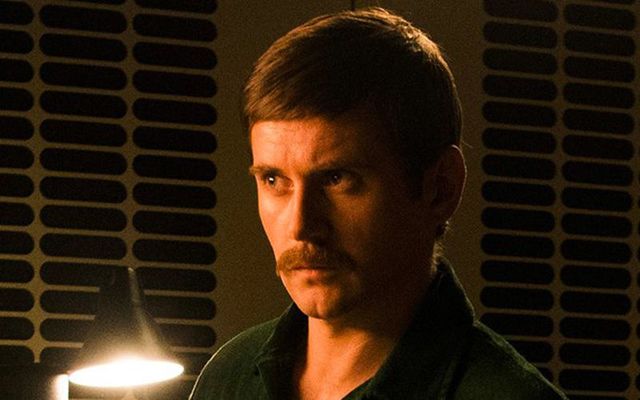
But look, it’s a film designed to please crowds and it certainly does that. Initially directed by X-Men helmer Bryan Singer, before being booted by Fox after going AWOL and replaced with Dexter Fletcher (Singer retains directorial credit, with Fletcher getting a producer credit for his troubles), the film is a barrage of sound and music and dedicated performances. As Mercury, Rami Malek absolutely holds your attention throughout, a charismatic and charming portrayal of a man struggling with his own inner demons, as pure a lost creative soul as there has ever been, and the actor’s physical mannerisms (how they got his teeth to protrude like Mercury’s I’ll never know) and showmanship are a far cry from his more subdued work in Mr Robot. Malik is the reason to see this, without doubt. His co-stars as Queen are excellent, particularly Jurassic Park kid-grown-up Joseph Mazzello and Gwylim Lee as John Deacon and Brian May respectively, while Tom Hollander’s work as the band’s lawyer-turned-manager is absolutely brilliant. A scene involving record producer Ray Foster, played by Mike Myers, discussing the merits of the band’s iconic track “Bohemian Rhapsody,” is so beautifully meta, fans of Wayne and Garth will be squirming in their seats with glee.
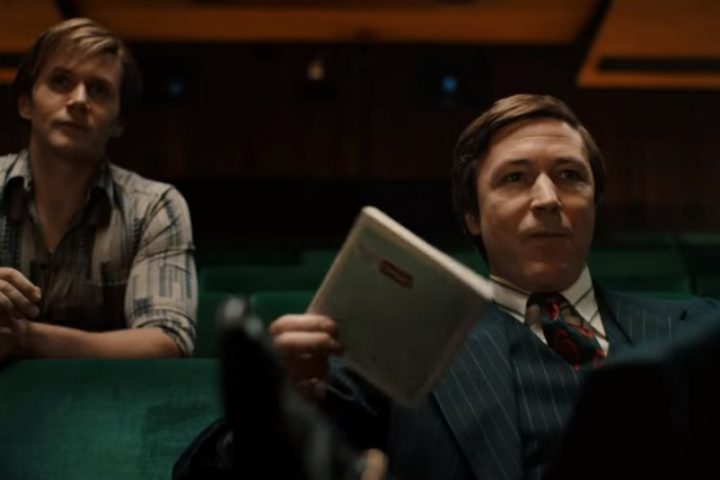
Allen Leech (Downton Abbey) has the hard task of playing the film’s “antagonist”, Paul Prenter, the man who single-handedly almost stole the world of Queen from us, and it’s this aspect of the film I was troubled by. Prenter became Mercury’s personal manager following his marriage breakdown with Mary, and in Bohemian Rhapsody he’s portrayed as a slimy, insidious leech desperate to sponge off Freddie’s success for his own pleasure. Mixing historical truths to manufacture a more rounded dramatic narrative with the character, the film portrays Prenter as being a retaliatory type who “outs” Mercury following his firing prior to the live Aid concert (in reality, Prenter was fired the year after Live Aid, and gave his scathing interview to a newspaper rather than television, as depicted here), and you get the sense that in trying to maximise emotional heft, Singer/Fletcher and McCarten had to flex the truth a bit to make it… well, sing. Leech’s work is effective in that he makes Prenter a hiss-worthy villain, but I suspect the truth about his relationship with Freddie was far less one-note and a load more complicated than that given us here.
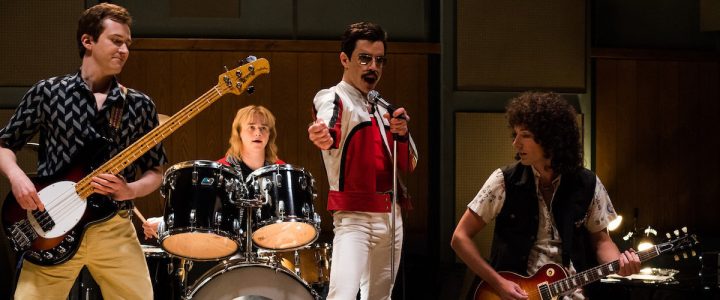
The recreations of classic Queen moments, including a scene showcasing their most famous music video (“I Want To Break Free”), their US tour concerts, and of course the amazing 20-minute Wembly Live Aid set (condensed down to somewhere between ten and fifteen minutes of pure musical joy in this film), are produced superbly, enabled by stunning costume and set design and some terrific cinematography by sublime Thomas Newton Sigel. The photography in the film is beautiful, with some truly stunning shots enabling whoever directed the film to showcase their proficiency and talent in creating the bohemian world of Mercury’s legendary frontman status. The visual effects work well (although get a bit wobbly by the time Wembley arrives) and the thunderous Queen song soundtrack, which absolutely slays in every sense, will have you singing along for the entire movie.
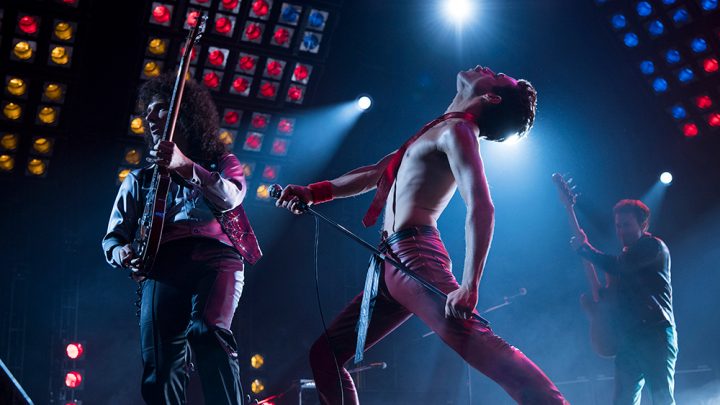
Bohemian Rhapsody is a film that approaches its subject matter with withering glee and an almost fawning adoration. It paints the Queen members in a lovely light, a camaraderie you just know is glossed over somewhat for the sake of dramatic expediency, and those outside the band as mere hangers-on who seek to ride the coattails to success. It portrays Freddie as a lost child of acceptance, seeking confirmation of self through the music he produced and the fame he achieved. The film’s sense of humour is cheeky and you’ll spend a lot of time laughing quietly to yourself if not out loud, and the central performances are genuinely excellent despite a narrative thinness to everyone other than Malek’s Freddie. Superbly mounted and boasting an instant-classic soundtrack, Bohemian Rhapsody pleases the masses and entertains the fans but doesn’t feel like it’s offering something new, rather taking us on a hand-held tour down memory lane with some dynamite concert performances thrown in. There’s no dirt, no real digging into what made Queen tick, and if that’s what you’re after you may feel shortchanged. The rest of us, however, will come away thoroughly entertained.


A spot on review. Good job!
Hey Robert, long time no hear! Glad you enjoyed the review, sounds like you enjoyed the film too! Nothing beats Queen’s thumping music in Dolby Atmos, I’d wager.